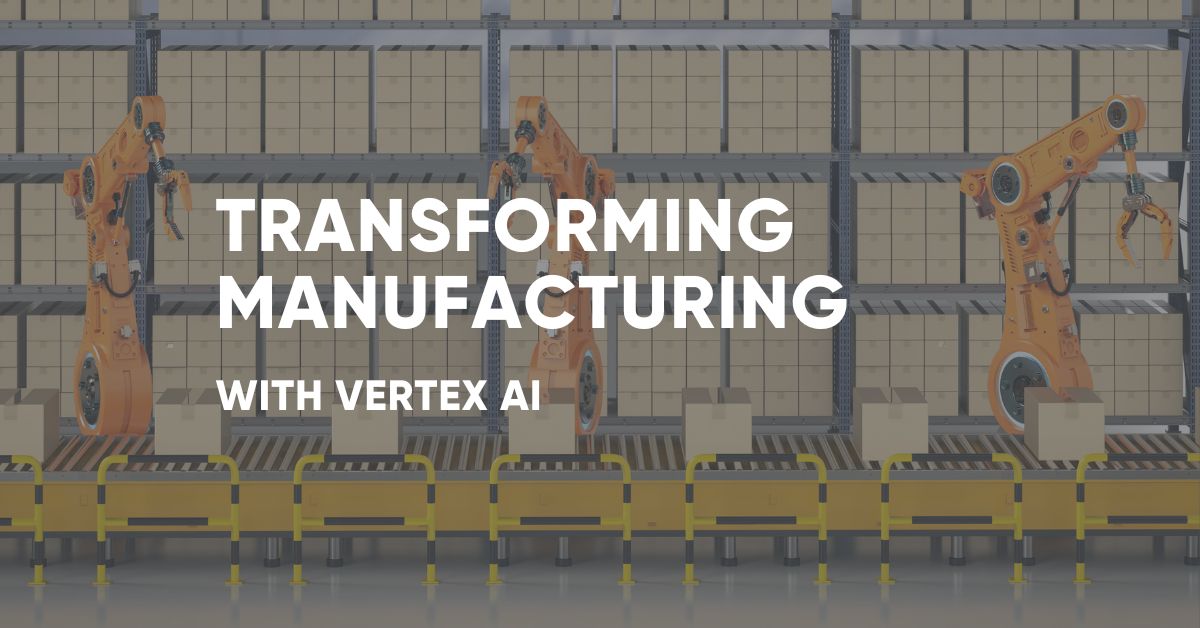Vertex AI, powered by Google Cloud, has emerged as a game-changer for Manufacturing. This advanced AI and machine learning platform is being utilized to optimize manufacturing processes, enhance efficiency, and address complex challenges. Let’s explore how Vertex AI is making a significant impact on the manufacturing industry, how to implement AI solutions, the problems they solve, and why partnering with an experienced AI team can be a strategic advantage.
Manufacturing is facing new challenges
Recent history brought about significant new challenges for Manufacturing organizations.
Shifting customer expectations: B2B buyers are expecting more integrated experiences with manufacturers, something that many current systems are not designed for.
AI demand: Businesses in all industries are increasingly exploring and investing in AI. What could be a competitive advantage today may be table stakes in 3-5 years.
Supply chain disruption: The supply chain disruptions that became common during the COVID-19 pandemic show no signs of stopping. McKinsey predicts that 45% of the average company’s yearly earnings will be lost over the next decade due to supply chains. (McKinsey & Company “Getting ahead of supply chain risks”)
Worker shortages: Over half of the Manufacturers have reported struggling to find the right talent for their organizations.
Sustainability: The demands from consumers and government agencies to improve sustainability are increasing.
Vertex AI can be the backbone of the solutions to each of the above challenges.
The Implementation Process
When we talk to Manufacturers, one of their key concerns is that they don’t have the talent or the technology to design and implement an AI solution successfully. With the right partners, it can be easier than you believe. The successful implementation of Vertex AI in manufacturing begins with a strategic approach and involves the following key steps:
- Data Collection: Gathering and organizing data from various sources, such as sensors, equipment, and production lines, is the initial step. This data forms the foundation for AI model development.
- Model Development: Data scientists and machine learning engineers use Vertex AI to create custom AI models tailored to specific manufacturing needs. These models can predict maintenance needs, optimize production schedules, and improve quality control.
- Integration: Integrating the AI models into the manufacturing infrastructure is a critical step. It enables real-time data analysis and decision-making.
- Monitoring and Maintenance: Continuous monitoring and maintenance ensure that the AI models remain accurate and effective. Data drift, model degradation, or shifts in manufacturing processes may require adjustments.
Other Key Use Cases for Vertex AI in Manufacturing
Beyond those mentioned above, Vertex AI is already addressing several critical challenges in manufacturing:
- Predictive Maintenance: By analyzing data from sensors and equipment, Vertex AI can predict when machinery is likely to fail, allowing proactive maintenance to minimize downtime and reduce operational costs.
- Quality Control: Machine learning models paired with computer vision can detect defects and anomalies in real-time, ensuring that only high-quality products reach consumers, thereby reducing rework and scrap.
- Production Optimization: Vertex AI can optimize production schedules, resource allocation, and inventory management, reducing waste and increasing efficiency.
- Supply Chain Management: It can enhance supply chain visibility, helping manufacturers respond to changes in demand and supply dynamics quickly.
- Energy Efficiency: By analyzing energy consumption data, Vertex AI can suggest strategies to reduce energy costs and minimize the environmental footprint of manufacturing operations.
Enhancing Manufacturing Processes
Vertex AI can enhance various aspects of the manufacturing process, many of them tedious and time-consuming. This frees up workers to focus on more strategic issues where they can add more value. Some of these area include:
- Production Planning: Optimizing production schedules and resource allocation to meet demand while minimizing lead times and costs.
- Inventory Management: Predicting inventory requirements, reducing carrying costs, and minimizing shortages.
- Operational Monitoring: AI is able to quickly analyze tremendous amounts of data and recommend ways to improve performance.
ClearObject as an AI partner
ClearObject, a leading system integrator specializing in IoT and AI solutions, plays a pivotal role in leveraging Vertex AI for manufacturing. As a Google GenAI Launch partner, ClearObject offers a comprehensive approach to implementing AI solutions, starting with a deep understanding of the manufacturing process and the unique challenges faced by each organization. The right AI partner should provide:
- Consultation and Assessment: ClearObject assesses a manufacturer’s specific needs and objectives, recommending the most suitable Vertex AI applications for their operations.
- Custom Solution Development: They work closely with data scientists and engineers to develop custom AI models and integrate them seamlessly into the manufacturing environment.
- Deployment and Maintenance: ClearObject ensures a smooth transition to AI-driven processes and provides ongoing support and maintenance to ensure the system’s effectiveness.
- Performance Monitoring: ClearObject constantly monitors AI models to ensure they remain accurate and relevant as manufacturing conditions change.
Vertex AI is revolutionizing the manufacturing industry by addressing critical challenges, optimizing processes, and improving efficiency. The partnership between manufacturers and experienced teams like ClearObject is pivotal in harnessing the full potential of Vertex AI, ensuring that manufacturing processes are not only more efficient but also future-proofed in an ever-evolving industry. With Vertex AI and trusted partners like ClearObject, manufacturers can navigate the complex landscape of Industry 4.0 and stay competitive in a rapidly changing world.

